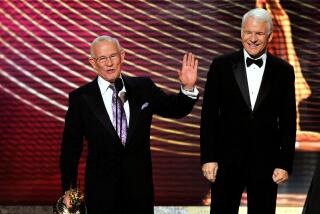NONFICTION - June 19, 1994
- Share via
SO FAR, SO GOOD: A Memoir by Burgess Meredith (Little, Brown: $22.95; 288 pp.) Burgess Meredith may have waited a heartbeat too long. He’s been busy. That’s good, for those who appreciate a solid performance: To this day, Meredith has never, ever disappointed. That’s not so good for his biography, which is inclined to ramble, to peter out. Of course, Meredith’s peter is a lesser man’s pizazz.
Meredith is 83, or 85, or something like that (you know how actors are). Started acting in the late ‘20s, and never stopped. Knew everybody, worked with most, slept with not a few (Tallulah Bankhead; the heavenly Hedy Lamarr; Marlene Dietrich; Ingrid Bergman, most likely; and others still breathing, thus exempt from a gentleman’s memoirs). “God knows I was not a dashing swain,” he writes, “but in a kind of mongrel way I chased the foxes.” Raised hell with roomie Jimmy Stewart. Hunted for sunken treasure with John Steinbeck. Married Paulette Goddard, after Charlie Chaplin, before Erich Maria Remarque. Smoked opium and recited Joyce with James Mason in a Hong Kong hotel room. Cruised the Sea of Cortez with John Huston looking for the meaning of life. Made Joe McCarthy’s “red channel” list--and won an Emmy for playing Joseph Welsh in “Tail Gunner Joe.” Schmoozed under the stars with Harry Hopkins on the lawn of Roosevelt’s White House (Franklin, not Teddy). As an Air Corps officer, persuaded Cole Porter to write a song for the Glider Division. (“ ‘Glide, glider, glide, for Christ’s sake,’ said the general. ‘You don’t want me to take that to the guys, do you?’ ”)
They’re here, all of them, Katherine Cornell to Sly Stallone, James Baldwin, Orson Welles, Aldous Huxley, Ernie Pyle, Henry Fonda, Gorgeous Gussie, Brecht and Weill and Lenya; Brando and Thurber; Zero Mostel learning to walk like a geisha; agnostic Charles Laughton reading the Bible over the radio. There are also snippets of wisdom on acting, directing--living--and all sorts of meandering fun, and one can only marvel at what the old actor must have forgotten. Still, the next time he says, “I remember the time that . . . “ prick up your ears. It’s bound to be choice.
More to Read
Sign up for our Book Club newsletter
Get the latest news, events and more from the Los Angeles Times Book Club, and help us get L.A. reading and talking.
You may occasionally receive promotional content from the Los Angeles Times.









